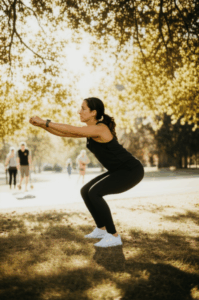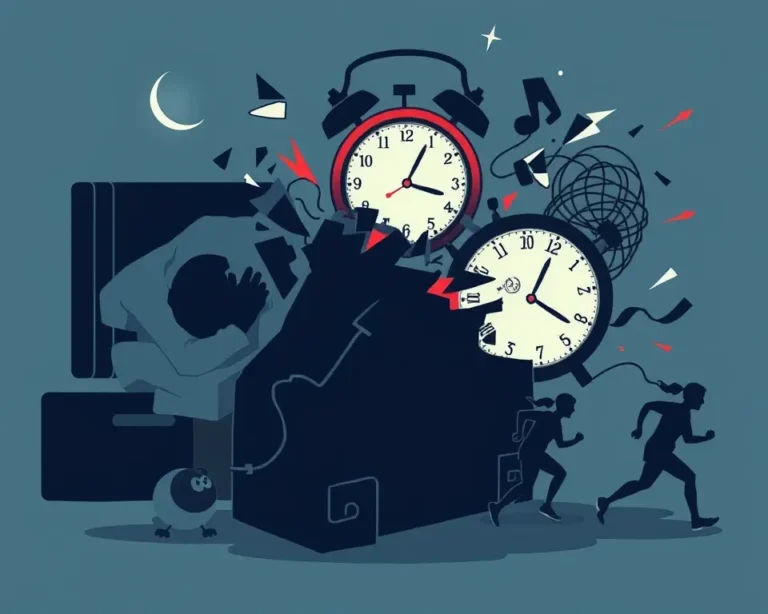Can’t seem to drift off to sleep? You might want to rethink your exercise routine. While exercise is generally touted as a health booster, new research suggests that the timing and intensity of your workouts could be sabotaging your sleep. Let’s dive into what the science says and how you can optimize your fitness regime for better rest.
The Exercise-Sleep Connection: A Double-Edged Sword
For years, health experts have recommended regular physical activity to improve sleep quality. Exercise can help regulate your circadian rhythm, reduce stress, and tire you out physically, all of which can promote better sleep. However, recent studies reveal a more nuanced relationship between exercise and sleep, indicating that certain types of exercise, especially when performed close to bedtime, might actually hinder sleep.
The Impact of Exercise Timing
One of the critical factors influencing how exercise affects sleep is timing. Exercising too close to bedtime can interfere with your ability to fall asleep. Here’s why:
- Increased Body Temperature: Exercise elevates your body temperature. While a slight dip in body temperature is a natural signal for sleep, a post-workout temperature spike can keep you awake.
- Hormonal Changes: Physical activity stimulates the release of cortisol and adrenaline, hormones that increase alertness and energy levels. These hormones can linger in your system for a few hours, making it difficult to wind down for sleep.
- Heightened Arousal: Intense workouts can increase your heart rate and keep your nervous system in a state of high alert, counteracting the relaxation needed for sleep.
Study Insights: What the Research Reveals
Several studies have investigated the intricate relationship between exercise and sleep, providing valuable insights into how to optimize your workout schedule for better rest.
- Moderate vs. Vigorous Exercise: A systematic review published in Taylor & Francis Online found that moderate physical activity (PA) is more effective than vigorous activity in improving sleep quality. Moderate activities like walking, Tai chi, and daily home exercises were linked to better sleep outcomes, especially in young and older populations.
- Morning Exercise Benefits: Research featured in Frontiers in Neurology indicated that morning exercise significantly improves sleep quality in university students. The study found that morning workouts led to increased melatonin and decreased cortisol levels in the evening, promoting better sleep.
- Evening Exercise Concerns: The same study raised concerns about evening exercise, which was associated with poorer sleep quality compared to morning workouts.
- Meta-Analytic Review: A meta-analysis in ResearchGate examined the effects of acute and regular exercise on sleep. It revealed that while regular exercise has small beneficial effects on total sleep time and sleep efficiency, the effects are moderated by factors like the time of day, exercise type, and individual characteristics.
The Role of Exercise Intensity
The intensity of your workouts also plays a crucial role in how they affect your sleep. Vigorous exercise, while beneficial for overall health, may not be the best choice close to bedtime.
- High-Intensity Workouts: High-intensity interval training (HIIT) and other vigorous activities can significantly elevate your heart rate and body temperature, making it harder to relax and fall asleep.
- Moderate-Intensity Activities: Moderate-intensity exercises like brisk walking, swimming, or cycling are less likely to disrupt your sleep. These activities can help reduce stress and improve overall sleep quality without causing excessive stimulation.
Optimizing Your Exercise Routine for Better Sleep
So, how can you ensure that your exercise routine promotes rather than hinders sleep? Here are some practical tips:
1. Schedule Workouts Strategically
- Morning or Mid-Day Workouts: Aim to exercise earlier in the day, preferably in the morning or early afternoon. This allows your body temperature and hormone levels to return to normal before bedtime.
- Avoid Late-Night Workouts: Steer clear of intense workouts within 2-3 hours of your bedtime. If you must exercise in the evening, opt for a light activity like a gentle walk or stretching.
2. Choose the Right Type of Exercise
- Moderate-Intensity Activities: Focus on moderate-intensity exercises that promote relaxation and stress reduction. Activities like yoga, Pilates, and Tai chi are excellent choices.
- Limit Vigorous Exercise in the Evening: If you enjoy high-intensity workouts, schedule them for earlier in the day to avoid sleep disruption.
3. Allow Time to Cool Down
- Post-Workout Cool-Down: After exercising, take time to cool down and relax. Gentle stretching, deep breathing exercises, and meditation can help lower your heart rate and body temperature.
- Pre-Sleep Routine: Establish a calming pre-sleep routine that includes activities like reading, taking a warm bath, or listening to relaxing music.
4. Consider Individual Factors
- Personal Response: Pay attention to how your body responds to exercise. Some people may be more sensitive to the effects of late-night workouts than others.
- Age and Fitness Level: Your age and fitness level can also influence how exercise affects your sleep. Older adults and those new to exercise may need to be more cautious about the timing and intensity of their workouts.
5. Prioritize Sleep Hygiene
- Consistent Sleep Schedule: Maintain a regular sleep schedule by going to bed and waking up at the same time each day, even on weekends.
- Optimize Sleep Environment: Create a sleep-friendly environment that is dark, quiet, and cool.
- Limit Screen Time: Avoid using electronic devices before bed, as the blue light emitted from screens can interfere with melatonin production.
The Broader Benefits of Exercise for Sleep
While the timing and intensity of exercise are crucial, it’s essential to remember the broader benefits of physical activity for sleep. Regular exercise can improve sleep quality by:
Reducing Stress and Anxiety
Exercise is a powerful stress reliever. Physical activity helps lower levels of stress hormones like cortisol and increases the production of endorphins, which have mood-boosting effects.
Regulating Circadian Rhythm
Regular exercise can help regulate your body’s natural sleep-wake cycle, making it easier to fall asleep and wake up at consistent times.
Improving Overall Health
Exercise can improve your overall physical and mental health, which can indirectly benefit your sleep. Regular physical activity is associated with a lower risk of chronic diseases like obesity, diabetes, and heart disease, all of which can negatively impact sleep.
Practical Examples and Scenarios
To illustrate how these principles can be applied in real life, here are a few examples:
Scenario 1: The Busy Professional
- Challenge: A busy professional works long hours and can only fit in workouts in the evening.
- Solution: Schedule workouts for the early evening (5-6 PM) and focus on moderate-intensity activities like brisk walking or swimming. Follow the workout with a relaxing cool-down routine, including stretching and deep breathing.
Scenario 2: The Insomnia Sufferer
- Challenge: An individual with insomnia struggles to fall asleep and stay asleep.
- Solution: Shift workouts to the morning and focus on moderate-intensity aerobic exercise. Incorporate mind-body practices like yoga or Tai chi to reduce stress and promote relaxation.
Scenario 3: The Fitness Enthusiast
- Challenge: A fitness enthusiast enjoys high-intensity workouts but struggles with sleep.
- Solution: Schedule HIIT workouts for the morning or early afternoon. Avoid intense exercise within 3 hours of bedtime and prioritize a calming pre-sleep routine.
Conclusion
The relationship between exercise and sleep is complex and multifaceted. While exercise is generally beneficial for sleep, the timing and intensity of your workouts can significantly impact your ability to fall asleep and stay asleep. By scheduling workouts strategically, choosing the right type of exercise, and prioritizing sleep hygiene, you can optimize your fitness routine for better rest and overall well-being. So, listen to your body, adjust your exercise habits accordingly, and unlock the secrets to a good night’s sleep.







